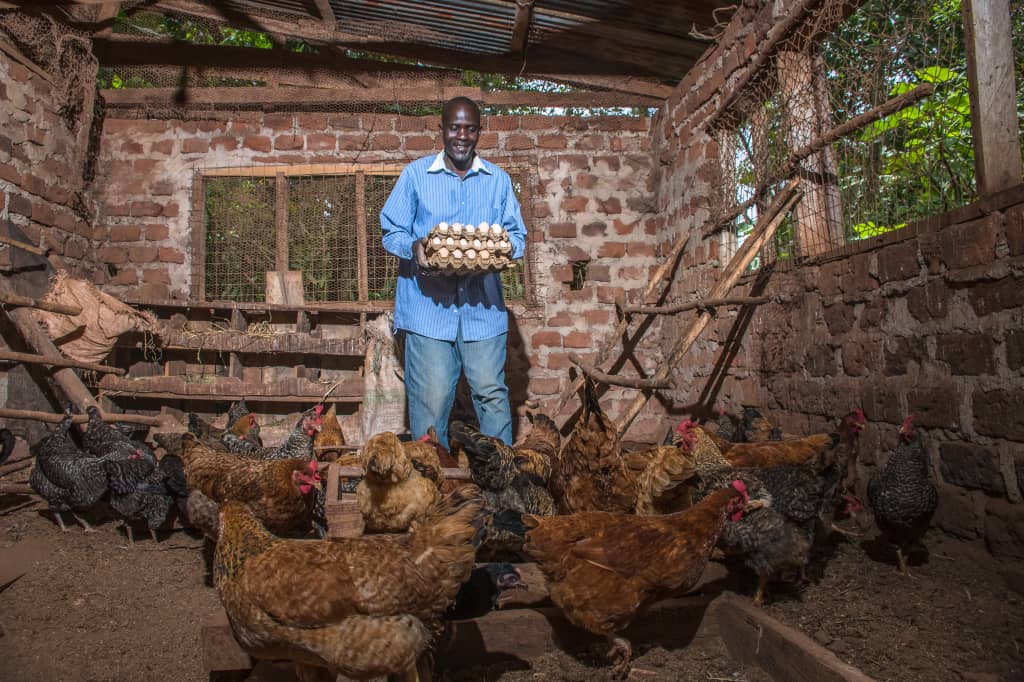
 Tiger FM
Tiger FM

 Tiger FM
Tiger FM
17 November 2024, 12:47 pm
By Ronald Ssemagonja
In 2006, Mr Kabwama Paul, a dedicated and visionary farmer, embarked on a journey that would transform his community in Uganda. As remarkable as it may seem, with just two hens and one cock of local chicken, Kabwama founded Shoreline Organic Farm.
Speaking to journalists in Kampala, Mr Kabwama explained why he chose to engage in chicken farming. “Local chickens are known for their ability to thrive on minimal feeding and treatment, and their natural behaviours, like sunbathing, enhance their immunity,” he said.
By adopting a free-range controlled system, Kabwama ensured that his chickens had ample space to forage for vegetation, insects, and ants. This natural diet, combined with regular exercise, not only kept the chickens healthy, but also resulted in high-quality eggs with vibrant yolks, which are highly sought after.
“The reproduction cycle of local chickens, also known as indigenous or free-range chickens, is a crucial aspect of poultry farming,” Kabwama explains. According to him, understanding this cycle helps a farmer manage their flocks more effectively, ensuring consistent production of eggs, meat, and chicks for expansion.
Local chickens naturally adapt to mating. The cock mates with multiple hens, ensuring a higher likelihood of fertilisation. The mating behaviour is often influenced by the rooster’s dominance and the hen’s receptivity.
Hens typically start laying eggs at around five to six months of age, depending on their diet, health, and environmental conditions. Local hens can lay eggs continuously for several months, with a laying cycle that may vary between individuals. A healthy local hen can lay eggs almost every day during her peak laying period, producing eight to twelve eggs in total, with an incubation period of twenty-one days.
However, the frequency can decrease due to factors such as poor nutrition, stress, or environmental changes. With proper care, his hens multiplied by reproducing, but he also bought and added more.
Through patience and determination, Kabwama observed all these changes from 2006 to the present, now owning a farm with over seven hundred local chickens. The economic viability of local chicken farming lies in its cost-effectiveness and market demand. The free-range system reduces feeding costs, as chickens supplement their diet through natural foraging.
Additionally, the demand for local chicken meat and eggs is strong in Uganda. Consumers prefer the taste and nutritional benefits of local chicken over commercially farmed ones, ensuring a steady market. Kabwama’s farm produces not only chickens and eggs, but also organic manure, which enriches the soil for crops and provides an additional revenue stream. This holistic approach to farming ensures multiple income sources and sustainability.
Kabwama’s future looks bright. “I am looking forward to having more chickens and also teaching some farmers who would like to learn about this,” he said. However, he acknowledges challenges such as feeding the chickens during drought seasons, managing disease outbreaks, and security threats from thieves.
Despite these challenges, Kabwama is optimistic about the future. He believes that training in the use of local herbs for poultry health can provide sustainable solutions to disease management. However, while local incubators might be viable for small-scale operations, Kabwama recognises that for his larger-scale ambitions, more advanced technology will be necessary.
